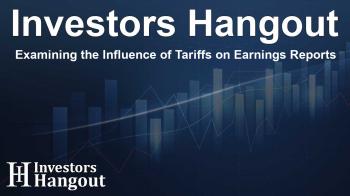Examining the Influence of Tariffs on Earnings Reports

The Impact of Tariffs on Earnings Season
As earnings season approaches, many are contemplating the effects of tariffs introduced recently. Economists, including those from Goldman Sachs, suggest these tariffs could significantly hinder earnings across various sectors.
In recent months, tariffs were initially implemented with a baseline rate of 10% on most imports. While some broader tariffs were postponed, their presence is strongly felt. As per analysis from the Yale Budget Lab, the average effective tariff rate is now around 14%, a notable increase from 3% just a year prior, and projections indicate it could rise to 17% as we progress through the year.
Next week’s batch of Q2 earnings reports will shed light on how these tariffs are influencing corporate profits. Key questions arise: will companies pass these costs onto consumers, or will they absorb them, affecting their bottom lines?
"Clients have been keenly focused on who will ultimately shoulder the cost of tariffs," shares David Kostin, chief US equity strategist at Goldman Sachs. His insights highlight the ongoing examination of these financial pressures.
Passing Costs onto Consumers
Goldman Sachs economists have concluded that a significant majority of the tariff costs, about 70%, will likely be transferred to consumers. Businesses are expected to absorb merely 15% of these costs, which aligns with foreign exporters facing the same burden. Interestingly, recent data indicates that tariffs haven’t yet caused a major spike in pricing as earlier predicted, with minor increases noted in May.
Contrary to Goldman’s estimates, other industry surveys suggest a different distribution of costs, forecasting that consumers might take on 49% of the tariff impacts while US firms could absorb 39% and foreign exporters only 12%.
"Early earnings results offer conflicting messages on the margin outlook," Kostin noted. While some firms are implementing modest price hikes, others, particularly those most affected by tariffs, have adjusted prices more aggressively.
Analysts at Goldman Sachs highlight that revised corporate margin estimates indicate some firms might struggle to overcome the adverse effects of tariffs. Conversely, businesses utilizing their existing inventories pre-tariff have managed to stabilize their financials better.
Anticipated Slowdown in Earnings Growth
Looking ahead, Goldman Sachs anticipates a slowdown in year-over-year earnings per share growth, expecting a decrease to 4% for Q2, down from 12% in Q1. Moreover, it’s projected that margins could contract by 50 basis points to 11.6%, sliding from 12.1% in the previous quarter.
“We expect the S&P 500 in aggregate will beat the low bar set for the second quarter,” Kostin predicted, offering a glimmer of optimism amid the uncertainties.
Notably, though tariffs could impact capital spending, Goldman Sachs does not foresee a significant reduction in overall expenditure. In fact, analysts have upgraded their forecasts for capital spending, acknowledging stark variances across different sectors. Companies heavily invested in artificial intelligence are ramping up, while others have lessened their spending amid ongoing policy uncertainties.
For the year, Goldman Sachs predicts that S&P 500 companies will see average earnings growth of 7%, projecting $262 per share—outpacing the median analyst forecast of 6% growth to $260.
Looking at the S&P 500, Kostin’s projections suggest it could reach a level of 6,500 within the next year, representing an increase of 4% from current standing.
Frequently Asked Questions
1. What are the expected effects of tariffs on earnings?
Analysts predict that tariffs will reduce earnings growth and increase costs for consumers as businesses pass a large portion of these costs along.
2. How much of the tariff burden will businesses absorb?
Businesses are expected to absorb about 15% of the tariff costs, with the majority passed on to consumers.
3. What is Goldman Sachs' outlook for corporate earnings?
Goldman Sachs forecasts a 4% growth in earnings per share for Q2, down from 12% growth in Q1, indicating a slowdown.
4. Will capital spending be affected by tariffs?
While there are concerns, Goldman Sachs does not expect tariffs to significantly cut overall capital spending, although variations exist by sector.
5. What are the projections for the S&P 500?
Kostin's team anticipates the S&P 500 could reach 6,500 in the next year, reflecting a 4% increase from its current level.
About The Author
Contact Kelly Martin privately here. Or send an email with ATTN: Kelly Martin as the subject to contact@investorshangout.com.
About Investors Hangout
Investors Hangout is a leading online stock forum for financial discussion and learning, offering a wide range of free tools and resources. It draws in traders of all levels, who exchange market knowledge, investigate trading tactics, and keep an eye on industry developments in real time. Featuring financial articles, stock message boards, quotes, charts, company profiles, and live news updates. Through cooperative learning and a wealth of informational resources, it helps users from novices creating their first portfolios to experts honing their techniques. Join Investors Hangout today: https://investorshangout.com/
The content of this article is based on factual, publicly available information and does not represent legal, financial, or investment advice. Investors Hangout does not offer financial advice, and the author is not a licensed financial advisor. Consult a qualified advisor before making any financial or investment decisions based on this article. This article should not be considered advice to purchase, sell, or hold any securities or other investments. If any of the material provided here is inaccurate, please contact us for corrections.

